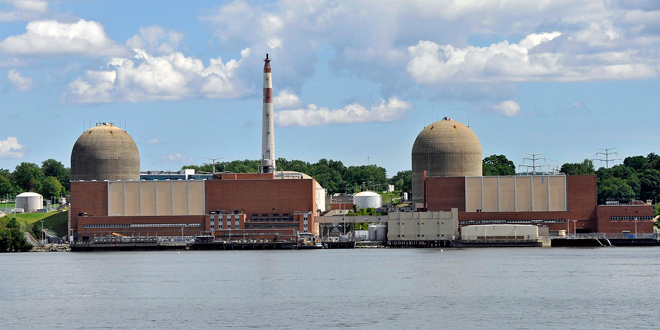By William Opalka
New York’s highest court ruled Monday that the Indian Point nuclear plant is subject to state coastal waters rules — a potential hurdle in Entergy’s bid to extend the plant’s operating licenses.
The unanimous Court of Appeals ruling said that Entergy must obtain a Department of State permit under the state’s Coastal Zone Management program. Indian Point Units 2 and 3 are on the banks of the Hudson River, 30 miles north of New York City.
“In sum, the Department of State’s interpretation of the exemptions in the Coastal Management Program, and its conclusion that Entergy’s application to relicense the nuclear reactors at Indian Point is subject to consistency review, are rational and must be sustained,” the court said.
New York’s CMP, adopted in 1982, includes protections for fish and wildlife while also “meeting public energy needs in an environmentally safe manner,” according to the opinion.
License Extensions
The plants were licensed by the U.S. Nuclear Regulatory Commission in the early 1970s and are operating under extensions while the commission reviews their applications for 20-year license renewals.
Entergy applied for the license renewals in 2007 and initially conceded that its application was subject to the state review under the CMP. In 2012, however, Entergy changed its position, arguing that the plants were grandfathered.
The court disagreed, saying that relicensing applications require new permits. Nuclear power plants’ use of state waterways is listed as a regulated use.
“Entergy is reviewing the court’s decision to determine its next steps, which could include refiling its Coastal Zone Management application that Entergy previously withdrew pending issuance of the NRC’s final supplemental environmental impact statement,” the company said in a statement. “Notwithstanding this court decision, we continue to believe we will ultimately be successful in obtaining a CZM permit and relicensing Indian Point. The facility continues to safely operate in a manner that is fully protective of the Hudson River and in compliance with state and federal law.”
The 16-page decision overturned a previous ruling from an Appellate Division court, which sided with Entergy.
The state’s objections to Indian Point will now be considered as part of the record for federal relicensing. However, if the state eventually denies a coastal certification, the plant owner could appeal to the U.S. Department of Commerce, which could override the state’s action, according to the decision.
Entergy also has a concurrent challenge pending in the U.S. District Court for the Northern District of New York. It sued New York in January, claiming the state’s attempts to require a CMP review intrudes on federal jurisdiction.
According to Entergy’s 2016 Form 10-K, New York is citing “nuclear safety concerns.”
That is a persistent complaint after a series of mishaps occurred in recent years at the plant.
“Indian Point is antiquated and does not belong on the Hudson River in close proximity to New York City, where it poses a threat not only to the coastal resources and uses of the river, but to millions of New Yorkers living and working in the surrounding community,” Gov. Andrew Cuomo said in a statement.
Cuomo, along with several of the state’s environmental organizations, has long advocated the plant’s closure. (See Environmental Groups Press for Indian Point Shutdown.)
Cooling Towers
Entergy also has been challenging New York’s contention that closed-cycle cooling would be the “best technology available” for addressing concerns over the impact of the nuclear plants’ cooling water intakes on aquatic life.
The company has estimated that retrofitting Indian Point with cooling towers would cost more than $1.2 billion. The company proposed as an alternative the use of cylindrical wedgewire screens at an estimated cost of $250 million to $300 million.
Because of the uncertainty over whether it will succeed in relicensing, Entergy said it may enter into fewer unit-contingent forward sales contracts for output from the plants.




